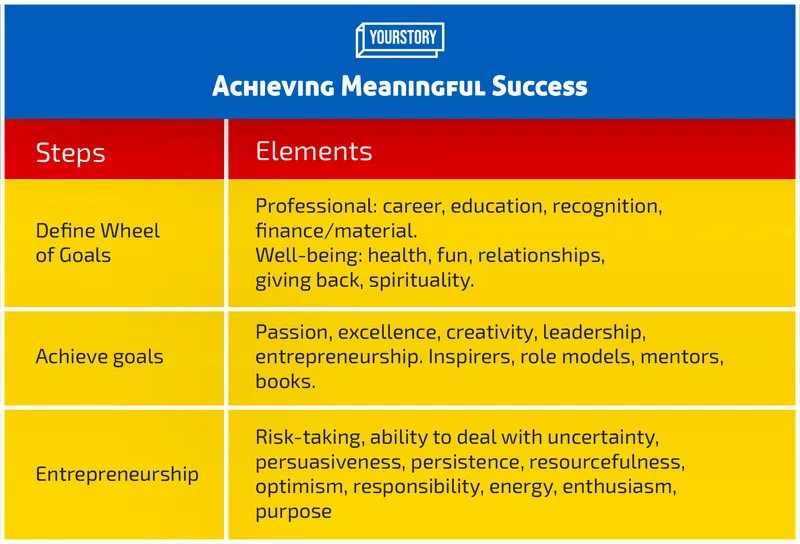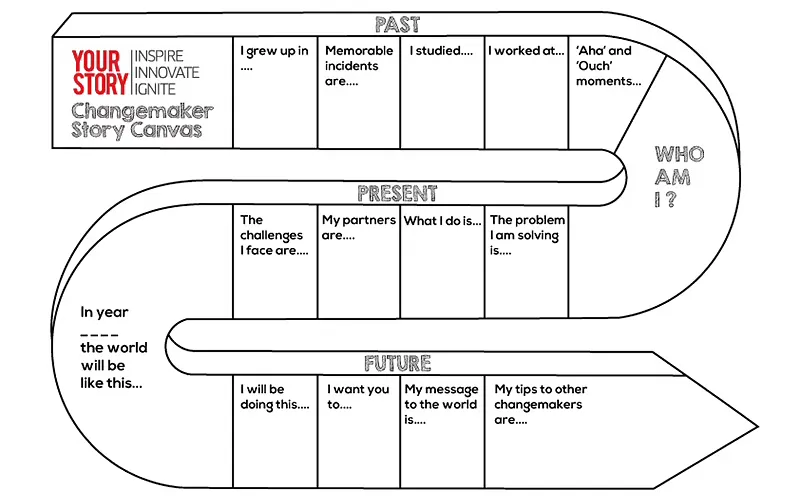Goals, commitment, inspiration – how to achieve meaningful success and become the best version of yourself
This new book provides a wealth of insights into unleashing your potential in professional and personal life. Here are some key takeaways – enjoy!
Launched in 2012, YourStory's Book Review section features over 330 titles on creativity, innovation, entrepreneurship, and digital transformation. See also our related columns The Turning Point, Techie Tuesdays, and Storybites.
How do you define who you want to be in life, and how does this help? How do you become a better version of yourself? What can you learn from others who have been successful in life?
Answers to these questions are well explained in the compelling book, Achieving Meaningful Success: Unleash the Power of Me! by Vivek Mansingh, with novelist Rachna Thakurdas.
“Meaningful success is when a person sets his/her multidimensional balanced aspirational life goals and achieves them,” Vivek begins. “The power of having a goal and writing it down is it tells us, in no uncertain terms, what is to be achieved,” he adds.
Goals change with successive achievements in life. “Different goals take precedence in different phases of life,” he observes. Goals can be set for milestones of a year to ten years ahead, or beyond.
Vivek Mansingh is a tech leader, entrepreneur, and innovator, and has worked at HP, Fujitsu, Apple, Dell, and Cisco. He is a GP at YourNest VC Fund, and graduated from NIT Allahabad and Queen's University, Canada. He has six US patents, and is on a mission to mentor a million people.
The material is written in an engaging storytelling style. Here are my key takeaways from this valuable 300-page book, summarised as well in the table below. See also my reviews of the related books Trillion Dollar Coach, Ikigai, Think Again, Multipliers, The Creative Curve, and Intrinsic.

I. Defining goals
Mansingh advises defining goals in two categories: professional and well-being. Typically, people may spend 70 percent of their time and effort for professional activities, and 30 percent on personal.
Goals should be SMART – specific, measurable, achievable, realistic, and timely. They can include business gains, relationship milestones, health targets, charity donations, and entertainment activities.
Goal-setting can begin right in school years, thought it may be tough to differentiate between a hobby and a career at this stage, Mansingh observes. Not all goals can be attended to each day, but should be addressed within a realistic period of time.
“Your future should not be decided by an extrapolation of your past. It should be driven by the aspirations of the future,” he emphasises.
One should be prepared for setbacks and sudden shifts as well. “Failure is not the opposite of success, it is a springboard to success,” Mansingh affirms.

II. Becoming the best version of yourself
Passion gives “healthy self-belief” that the goals can be achieved. “A good example of passion-driven people are the founders of startups,” Mansingh observes.
Excellence comes from performance improvement and benchmarking. It calls for discipline and alignment of efforts with plans.
“Innovation is a skill, a combination of art, science and creativity that can be learnt by individuals and companies,” Mansingh describes. Steps to innovation including setting quantifiable goals, thinking out of the box, and collaboration.
“There is no correlation between intelligence and creativity,” Mansingh clarifies. Creativity comes from imagination, visualisation, and habit, and not just a stroke of genius.
Leaders are knowledgeable, passionate, articulate, and inspirational. “Leaders create leaders,” he observes. But the leadership journey isn’t easy, and some people may be annoyed at if you push them out of their comfort zone.

III. Four more Gods
Mansingh also defines “four more Gods” one needs in the journey: inspirers, role models, mentors, and books. Inspirers can be from other fields, while role models are those who one would aspire to be like – both can change over the course of life.
Mentors are knowledgeable, inspirational, and compassionate, and clarify things or even shake you up. Coaching is more specific and short-term, mentoring is more holistic and long-term.
“Reading helps you grow mentally, emotionally and psychologically. It keeps you updated and makes you smarter,” Mansingh advises. “Most successful people are proficient book-readers and acknowledge the role reading books has played in their success,” he adds.

IV. Entrepreneurship
Entrepreneurship is an inspiring journey full of learning and achievement – but is also a marathon with multiple fires to put out, and stiff competition from large firms.
Successful entrepreneurs are resourceful risk-takers, with an ability to deal with ambiguity and yet have a purpose. “The biggest trap you need to watch out for is confirmation bias,” Mansingh cautions.
“Thought shalt be an engaging storyteller,” he defines as a commandment of entrepreneurship. He also cites Shradha Sharma, Founder of YourStory, who cautions that the entrepreneurial journey can be “bittersweet”.
“Think big from the start and even bigger as you scale up,” Mansingh urges. Strong internal teams and effective external partnerships are key. Investors also look for founders who are open to being coached, and have a strongly differentiated value proposition.
Vani Kola, Founder of Kalaari Capital, defines five skills of entrepreneurs: conviction, ability to listen, grit, being purpose-driven, and open to continuous learning.

V. Wellbeing
“Relationships are the most valuable assets we have,” Mansingh emphasises. “Relationships not well-managed are the biggest source of regret in life,” he cautions. Too much social media usage can lead to a surfeit of shallow relationships.
“I left my career at its peak in the US to move to India to take care of my parents. Today, I consider it is one of my biggest achievements and source of fulfilment in life,” he recalls.
Opportunities for imparting meaning can rise in professional and personal relationships – through business networking and even small gestures of kindness to one’s watchman or to the underprivileged.
Travel, sports, music, dancing, and food are effective ways to destress through fun. Meditation and mindfulness have a transformational impact as well, Mansingh advises.
“Giving back helps you stay grounded in your journey to meaningful success and can add a deep sense of purpose in your life,” he affirms. These can be practiced in a structured manner as well, and there is much “power in generosity and giving back.”
This can include educating the children of one’s maids, donations for charities, volunteering with NGOs, donating books to libraries, and investing in social enterprises.

VI. Tips from the successful
An 80-page chapter captures success tips from a range of interviews across industrial sectors.
Good leaders inspire ordinary people to do extraordinary things. India needs more punctuality, peace, and harmony, and less of apathy, according to Infosys founder Narayana Murthy.
Ratan Tata shares how he practices doodling as a creative activity, particularly during boring meetings! He sees huge potential in India’s tech and startup movements.
Biocon’s Kiran Mazumdar-Shaw had a goal of putting India on the global bio-pharma map. “Get inspired by problems that you want to solve for your country and for the world,” she advises.
Dr Devi Shetty’s goal is to positively change millions of lives. He cautions that work-life balance can be difficult in fields like medicine. He sees lots of opportunity in med-tech impact.
Cisco’s John Chambers credits his business success to factors like customer focus, keenly understanding the market, and getting market transitions right. He begins each day with practices like going through a detailed bio of every person with whom he has a scheduled meeting.
He enjoys competing, and mentors startups to stretch themselves. “Leaders need to take risks and move fast. It is better to stumble first than arrive last,” John advises.
According to cricketer Rahul Dravid, excellence comes from introspection, perseverance, and a deep love for what you do. Different kinds of coaches are needed as roles in life and career and change.

Britannia’s Vinita Bali defines her success formula through the acronym ACE: attitude, curiosity and excellence. Leadership is strengthened under pressure, and is a self-reinforcing loop in communities.
Janagraha’s Ramesh and Swati Ramanathan advise people to begin by contributing whatever and whenever they can to improve the society. “Great societies are made by average people solving public problems and adding value,” they suggest.
Another chapter shares lessons from Mansingh’s mentees, such as the importance of documenting and revisiting goals, seeking mentors, focusing on key skills, balancing optimism and realism, and giving back by mentoring the next generation.
“Always be mindful of the fact that you are not competing with yourself; you are striving to become the best version of yourself,” Mansingh signs off.
YourStory has also published the pocketbook ‘Proverbs and Quotes for Entrepreneurs: A World of Inspiration for Startups’ as a creative and motivational guide for innovators (downloadable as apps here: Apple, Android).
Edited by Megha Reddy



![[Year in Review 2021] 10 inspiring stories of people who made the world a better place](https://images.yourstory.com/cs/5/a09f22505c6411ea9c48a10bad99c62f/Imageha73-1640855877602.jpg?fm=png&auto=format&h=100&w=100&crop=entropy&fit=crop)
![[Year in Review 2021] Amid COVID-19, these 10 non-profits created social impact this year](https://images.yourstory.com/cs/5/79900dd0d91311e8a16045a90309d734/collage-1640102486726.png?fm=png&auto=format&h=100&w=100&crop=entropy&fit=crop)
![[Year in Review 2021] Meet the top 10 techies we celebrated this year](https://images.yourstory.com/cs/2/b87effd06a6611e9ad333f8a4777438f/collage4-1639196680900.png?fm=png&auto=format&h=100&w=100&crop=entropy&fit=crop)

![[Year in Review 2021] Top ten changemakers of the year](https://images.yourstory.com/cs/5/79900dd0d91311e8a16045a90309d734/collage1-1639488579193.png?fm=png&auto=format&h=100&w=100&crop=entropy&fit=crop)




